- Home
- Alton Gansky
By My Hands Page 2
By My Hands Read online
Page 2
Although Adam had been out of the recovery room for hours, he was still struggling to clear his mind of the anesthesia-induced fog when a nurse entered the room.
“So , we’ve decided to wake up, have we?” She spoke in a cheerful Jamaican accent.
“Do they teach all nurses to speak in the third-person plural?” The water had helped Adam’s voice.
“Just the good-looking ones.” She winked.
Adam couldn’t help noticing that her remark, flippant as it was, was certainly true—she was striking. Her ebony skin was highlighted by strong facial features: high cheekbones, a well-defined jawline, piercing dark eyes, and bright teeth that provided a stark contrast to her dark skin.
“Are you comfortable?” she asked, her eyes fixed on the plastic IV bags suspended over his head.
“Actually, I’ve felt much better.” As he finished the sentence, the nurse slipped a sterile covering over the electronic thermometer and placed it under his tongue. A few moments later the device beeped and revealed Adam’s temperature in red numbers: ninety-nine degrees.
“A little above normal, but nothing to be concerned about,” the nurse said as she recorded the statistic on Adam’s chart. Quickly and smoothly she finished her examination: blood pressure, pulse, and general appearance were checked and the proper notations made on the chart. It was obvious that she had done hundreds of such routine postoperative exams. Adam read her name tag—Ramona, R.N.
“While you’re at it,” Dick said, “why don’t you check his oil too?”
“I’m sure it would be a quart low.” The woman never missed a beat. She was the kind, Adam decided, who liked to tease and be teased. He would remember that whenever he needed cheering up.
“Ramona,” Adam said as she was leaving the room.
She turned to face him. “Yes?”
He wanted to say something witty in return, but his mind was still too sluggish, so he said, “Thanks.” She responded with a smile and another wink, then disappeared into the outer hall.
Sunday, March 1, 1992; 11:00 P.M.
“MR. BRIDGER.” The voice seemed distant. “Mr. Bridger.” Adam felt a hand on his arm. He struggled, willing himself awake. Slowly he opened his eyes. The lights seemed dimmer than before. It was still dark outside. He wondered how long he had been asleep. Focusing his eyes on the clock on the opposite wall, he saw that it was almost 11:00. He had been asleep for two hours. Adam realized that he must have fallen asleep while talking to Dick. Patients had done the same to him on many occasions.
“Mr. Bridger, I’m Dr. Tremaine, your surgeon.”
Adam shifted his gaze to the figure standing next to him, a woman in a white smock.
“I had planned to be here earlier, but an emergency kept me away.” Adam thought he detected impatience in her voice. “I want to ask you some questions.” She began a series of general queries about his medical history, followed by questions about his present condition. She kept her eyes fixed on Adam’s chart throughout the questioning, never making eye contact. The only time she looked up from the chart was to examine the three-inch-long incision on his lower abdomen.
Adam had not been in the ministry very long before he developed an ability to identify those who were intrinsically unhappy. Dr. Tremaine was a classic example.
“What were you doing when you had your attack?” She spit out her words quickly as though she were late for a meeting. Adam felt as if he were detaining her.
“I was in the pulpit.” Adam began shifting his position in the bed, but a stab of pain curtailed the action.
“Pulpit?” She sounded shocked.
“Yes. I’m the pastor of Maple Street Community Church.”
“I see,” she said. The disdain was obvious in her voice.
“Well, Mr. Bridger, or should I call you Reverend Bridger?” She emphasized the word Reverend.
“Actually, I prefer Adam.”
“Well then, didn’t you sense something was wrong prior to stepping behind the pulpit? Didn’t you have earlier discomfort? Or fever? Appendix problems don’t occur instantly, you know; they develop over a period of time. Surely you had earlier abdominal trouble today?”
“I always have stomach discomfort on Sunday morning: nerves— it goes with the job.” Adam could not understand the purpose of her questions, and was beginning to feel guilty for his illness. Taking a closer look at her, he saw a woman of less than average height, no taller than five-foot-one. Her hair was black and very short. She wore no makeup.
“I thought clergy feared no evil. ‘Thy rod, Thy staff’ and all that.” Her antagonism puzzled him.
“Not fear, Doctor,” he explained patiently. “Just a little anxiety. Keeps me humble.”
“Have you vomited since coming out of surgery?” she asked. “No. Just some soreness.”
“Your chart shows that you’ve had no trouble relieving yourself. Is that true?”
“Uh,” Adam flushed with embarrassment. There was no reason for abashment, but he felt his face become warm anyway. “I’ve gone to the bathroom once.”
“Is there anyone at home to take care of you?”
“No, I live alone.”
“You should have some help at home. I don’t want you ripping sutures out trying to get out of bed.”
“I appreciate your concern, but I think I can manage.” Adam forced a smile.
“It’s more caution than concern, Reverend. Be sure you get some help for a couple of days. Can you do that?”
“I think I can,” Adam replied quietly. Then he said firmly, “I’m sorry.”
“Sorry?” Dr. Tremaine said. “Sorry for what?”
“For inconveniencing you with my illness.” Adam made direct eye contact.
This time she blushed. “If I seem curt, it’s because I’ve had a rather frustrating day. I should’ve been home four hours ago.”
“I understand,” Adam said with a wry smile. “My day has been rather annoying too. At least you didn’t toss your breakfast in front of 400 people, surrender an internal organ, and find yourself confined to bed.”
An awkward silence hung in the room. Adam could see his doctor’s discomfort and felt a little guilty for causing it, but she needed to see beyond her own inconveniences.
Dr. Tremaine started to say something when her pager sounded. Without another word she turned and left the room. Adam watched as she strode purposefully away. “Saved by the bell,” he said, and then closed his eyes and searched for sleep.
Monday, March 2, 1992; 4:00 A.M.
THERE ARE FEW WARDS of a hospital more emotionally grueling than the one in which Lisa Hailey had spent the last two weeks. The burn ward at Kingston Memorial Hospital was considered one of the top three in the United States. Yet, despite its reputation, it was a horrible place to work, and an even more horrible place in which to stay. Burn ward nurses were considered the most dedicated and loving, yet as many as 50 percent of the staff left every two years. Burn patients faced far more than the usual discomfort of illness. Their pain was beyond description. Their burned skin left nerve endings exposed and raw. The halls were often filled with the groans of patients whose flesh had been rendered stiff and black. The odor of scorched flesh overpowered the usual antiseptic smells associated with hospitals. Only those with the strongest stomachs and the highest level of dedication chose to work here.
Lisa was alive—barely. The emergency room doctors had described her injuries as extensive; 60 percent of her body was covered with the blackened flesh of third-degree burns.
Lisa had been expected to die within one or two days, but so far she had endured twelve days of physical and mental anguish. Now that it appeared that she might live, there were baths of silver nitrate, long periods in a hyperbaric chamber, and huge quantities of fluid to receive: blood, plasma, and saline intravenously introduced into her body. At the end of each day, she was taken to a bed with no covering, for even a soft bed sheet on her exposed nerves caused excruciating pain.
The a
ccident was still fresh in her mind. It was all so unfair, so patently unfair. She had been returning home from a study session with a friend. Lisa was enjoying her senior year at Madison High School. A grade point average of 3.8 had allowed her the luxury of choices in colleges and universities. There was little that could make her life better, but many things that could make it worse.
One such thing was a drunk driver on Interstate 15. The MG Midget Lisa’s father had bought for her eighteenth birthday offered little protection against the three-quarter-ton pickup truck as it crossed over the center divider and crashed headlong into her. Her last second maneuvering had kept her from being killed instantly, but it could not keep the gas tank from rupturing. The ensuing fire engulfed her. The image of uncontrolled flames rising around her was etched deeply into her memory. The fire had not only scarred her body, but scarred her mind, searing an image of hell into her brain.
She relived that night every time she fell asleep. The ending was always the same—she lived. Why had she not died and saved herself and her family this ordeal? If she had died, she would be buried and her family would be going on with their lives. But now, every day they came, dressed in the green sterile clothing that all visitors wore, to see her grotesquely charred body.
The accident had burned all of Lisa’s hair from her head, as well as her eyebrows and lashes. Both legs were deeply burned and, if she continued to live, they would be amputated. The swollen and charred skin had made her unrecognizable to family and friends. Bill Payne, the high school’s first-string quarterback and Lisa’s steady boyfriend, had come by to visit the day after the accident; he had not been back since. They had secretly planned to be married after their first year of college, but that dream was over.
John Hailey, Lisa’s father, had said good-bye to his red-haired daughter at 6 o’clock that tragic evening. When he arrived at the hospital four hours later, he found the strange figure the doctors told him was Lisa. They had also told him it was a miracle she had lived. John wasn’t so sure.
Morphine quieted the noisier patients that evening. For a few hours they were oblivious to their environment and their pain. The hall lights had been dimmed and the nurses of station B-West had settled into their heroic yet dismal watch.
No one noticed the nondescript man in a white smock emerge from behind the stairwell door. He moved down the dim hall and into room 015 only to exit a few moments later. The unknown visitor made his way up the stairs and withdrew into the cool moonlit night. His task for the evening was finished.
Monday, March 2, 1992; 6:30 A.M.
WORD CIRCULATED QUICKLY THROUGH the hospital. With each telling of the story, the details were slightly altered, but the truth of the tale remained the same. Somehow, the horribly burned and disfigured body of Lisa Hailey had been changed. Skin, soft and pink, had replaced the scorched black flesh. The morning duty nurse, accustomed to seeing the worst that fate could deliver, lost her composure as she stepped into Lisa’s room. Her scream echoed through the burn ward. The nurses and doctors rushing to her aid were greeted by a perfectly healthy Lisa, who met each outburst of disbelief with an immense smile.
After gathering his composure, one doctor suggested that a camera be brought to the room to record the event. A nurse, sensitive to feelings that many miss, returned to her station and pulled a mirror from her purse and, making her way through the crowded doorway, slowly raised it so that Lisa could see what she had not been allowed to see for the last two weeks—her face.
Monday, March 2; 11:00 A.M.
“BECAUSE I NEED THE CHALLENGE.” Priscilla Simms spoke the words slowly, enunciating each syllable. Irwin Baker, the station’s news director, leaned back in his leather chair and stared at the woman across the desk. She was the epitome of the television anchor woman— strong, distinctive features, and a full head of red hair. Even without the special makeup and television lights, she was stunning. During the two years she had anchored the evening news on KGOT-TV, the ratings had steadily climbed until they were the number one station in San Diego.
“Priscilla, you knew that anchoring the evening news had both pluses and minuses,” Baker said firmly. “Investigative reporting has more challenges; anchoring has more money and prestige; you chose the latter.”
“I’m not asking to be an investigative reporter again. All I want is an occasional assignment that has some meat to it.”
“Like what?”
“I don’t know. Anything would be more challenging than reading a teleprompter every night like some mechanical mannequin.”
“You provide a valuable service. Hundreds of women—”
“—would love to have my job. The sad thing is that any one of them could do it. Irwin, I have a master’s degree in journalism.
I need a greater challenge. Give me something I can chew on, something that lets me use my talents.”
Irwin turned his chair slightly, just enough to gaze out the window, and ran a hand over his balding head. “Who will do your job while you’re out poking in the bushes and looking under rocks for your Pulitzer Prize?”
“I will.” Priscilla stood and leaned over Baker’s desk. “I’m not asking for every story, just one challenging enough to keep my skills sharp. I’m just as subject to the laws of physics as you. I’m getting older, and the time will come when our employers will decide, in their infinite wisdom, that I’m not appealing enough to the viewers. Then I’ll be out looking for work.”
Baker said nothing. What she was saying was true. It was not unusual for news stations to reassign or outright fire news anchors because age had taken away some of their sex appeal. Several stations had been sued for age and sex discrimination with only limited success for the plaintiffs.
“I’ve spent years honing my skills as a journalist,” Priscilla said pointedly, “and I don’t want to lose them.”
Baker had difficulty believing that Priscilla could be anything less than beautiful. She was a prize catch for any man, and many men had tried to claim her; but her indomitable spirit had left their egos bruised and battered. Even he had thought of asking her out, but had trouble mustering the courage. She was strong-willed and opinionated and had left several men shell-shocked.
“I don’t own the station, you know.” Irwin swiveled his chair back to face Priscilla.
“No, but you’ve worked here for a long time and you’re the only person who can get away with murder. No one will second-guess your decision.”
That was true enough. Irwin had come to KGOT-TV as a journalistic intern while still taking classes at San Diego State University. After graduation he was hired as an assistant news writer. His way with words and his ability to uncover facts from overlooked sources led to speedy advancement including several award-winning years at a large San Francisco station. Over the years he had developed a reputation as a solid newsman and a more than competent executive. The parent organization, Prime Television Group out of Phoenix, kept Irwin on staff with praise, frequent raises, and substantial bonuses. Other companies, including large market stations in Los Angeles, Chicago, and Houston, had tried to woo him away, but he stayed where he was. Irwin was nothing now if not loyal.
Irwin looked at her and smiled. “I’m waiting.”
“Waiting for what?” Priscilla asked suspiciously. A moment later she tightened her jaw and said, “If you think I’m going to break down and cry, or beg, or offer some sexual bribe then.
“No, no. Nothing like that,” Irwin said, holding up his hands. “I know you’re too professional for that. I’m waiting for the part where you say, ‘If I don’t get this assignment, then I’ll just have to take the job offer from XYZ-TV.’ ”
“Well, it’s not like I don’t get offers, you know. And the money in L.A. is a lot better than what I get here.”
“And?”
“Oh, come on, Irwin.” Priscilla was exasperated. “You know I don’t want to go anywhere, and you also know that I can do this.”
“Yeah,” Irwin said with a sigh.
“I know that you can. The question is, should you be doing it?”
“Dan Rather does it. Tom Brokaw does it. Why can’t I?”
“Because Rather and Brokaw have a bigger staff than I do, not to mention much bigger budgets. Besides, Rather and Brokaw don’t do investigative reporting.”
“Maybe not technically, but they’ve been known to travel all over the world to report on special events. Besides, this won’t cost the company more money. I’m not asking for a raise. I’m asking to do some investigative work like I used to do. What could that hurt?” The conversation lapsed into silence with Priscilla standing in front of Irwin’s desk and Irwin seated in his chair rubbing his forehead. “Well?” Priscilla asked a moment later.
“I’ll see what I can do.” Baker felt defeated.
“Great!”
“I didn’t say I’d do it, just that I would see what I could do.”
“I understand fully,” Priscilla said, grinning for the first time since she entered the office. “I’m not trying to pressure you.”
“Oh, right. Then why do I feel beat up?” Irwin asked.
“You just work too hard, that’s all.”
“Well, speaking of work, we better get to it. After all, we still have a news program to put together.”
Priscilla took her cue and walked to the door. As she was leaving, she turned to Irwin and offered a genuine smile. “Irwin, you’re the best.”

 At Sea (Harbingers Book 16)
At Sea (Harbingers Book 16)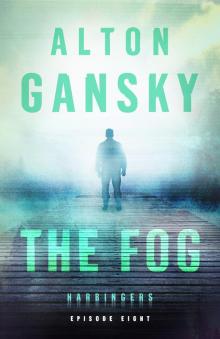 The Fog
The Fog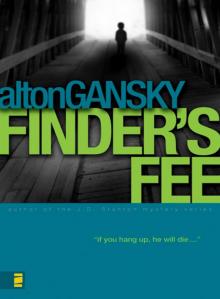 Finder's Fee
Finder's Fee Wounds
Wounds End Game (Harbingers Book 20)
End Game (Harbingers Book 20)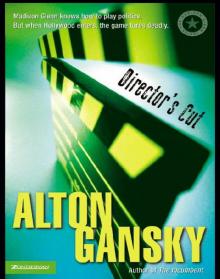 Director's Cut
Director's Cut Zero-G
Zero-G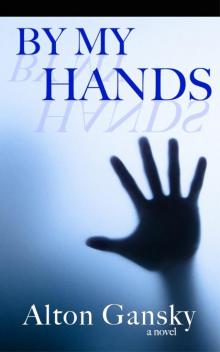 By My Hands
By My Hands The Village (Harbingers Book 12)
The Village (Harbingers Book 12) Beneath the Ice
Beneath the Ice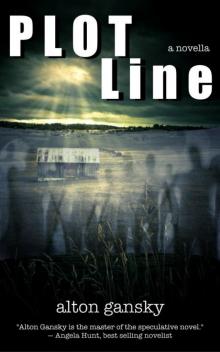 Plot Line
Plot Line Submerged
Submerged A Treasure Deep
A Treasure Deep